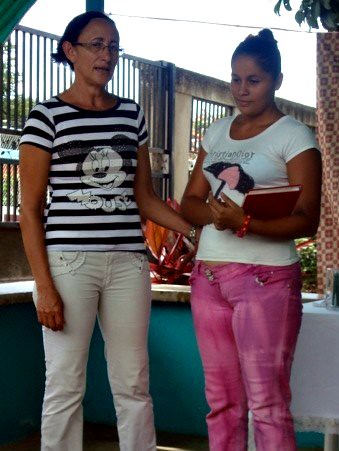My sister's name is Dorcas Baltazar,
and although she has never visited Venezuela, a number of people here
are becoming familiar with her first name. More precisely, with the
name of her biblical namesake.
According to Acts 9:36, “Now there
was at Joppa a certain disciple named Tabitha, which by
interpretation is called Dorcas...” Tabitha and Dorcas are
respectively the Aramaic and Greek forms of the word for gazelle.
Apparently she was known by both names (not an unusual situation in
that cosmopolitan era; the Apostle Peter was known as Simon bar-Jonah
and Petros, St. Paul as Saul of Tarsus and Paulos). St. Luke goes out
of his way to make sure that his Greek-speaking readers knew who he
was talking about.
We often speak of the “12 disciples”
in reference to the men who Jesus would choose as His apostles, since
the word essentially is a synonym for apprentice or student. However,
in New Testament usage, all believers in Jesus Christ were known as
His disciples, even as all Jews were known as “disciples of Moses.”
When Jesus comissioned the 12 apostles, He told them to “make
disciples of all nations, baptizing them in the name of the Father,
Son and Holy Spirit, teaching them to observe all that I have
commanded you.” Thus, all who have been baptized and instructed in
the Christian faith are disciples of Christ.
Nevertheless, Acts 9:36 is the only
passage in the New Testament which uses the feminine form of
“disciple” (μαθητρια). Luke 10:38 speaks of Mary of
Bethany seated at Jesus' feet and listening to His words in the
recognized manner of a disciple. There were other women prominent in
the life of the early church, such as Lydia of Thyatira (Acts 16:14);
Priscilla, who, along with her husband, Aquila, St. Paul called “my
helpers in Christ” (Romans 16:3); and Phoebe, the deaconess of
Cenchreae (Romans 16:1). But perhaps the word “discípula” (it's
feminine in Spanish, too) is used in Acts 9:36 to emphasize Dorcas'
importance to the church and her exemplary behavior.
“She was full of good works and acts of charity.” It is specifically mentioned that she made clothes for destitute widows and other needy people. So when she unexpectedly died, the church at Joppa (modern-day Jaffa; now as then a Mediterranean seaport, but now part of the Tel Aviv metropolitan area as well) prevailed on Peter to implore God's mercy for those who depended on her. And God, in His mercy, miraculously restored her to life (Acts 9:40-41).
Today some
dictionaries define “Dorcas society” generically as “a
society of women of a church whose work it is to provide clothing for
the poor.” The first modern
Dorcas society was founded on December 1, 1834, by Methodist
women on the Isle of Man as part of the community's thanksgiving for
being spared from an outbreak of cholera. There are “Dorcas
societies” and “Dorcas circles” in congregations throughout
the world, including many
Lutheran churches, serving in a variety of ways.
Sometimes these groups call themselves,
“the
Dorcas Project.” The Dorcas Project of Payne
County, Oklahoma, assists women who are dealing with breast
cancer.
Now there is a “Proyecto Dorcas” in
Venezuela. Recently Luz Maria traveled to Caracas to attend the
national convention of the Lutheran Church of Venezuela's women's
organization, SOLUDAVE (Sociedad de las Damas Luteranas de
Venezuela). She was elected vice president (the president is Mayerlin
Flores of Ascension Lutheran Church in San Félix de Guayana) and
also managed to get passed a resolution to organize Proyecto Dorcas
efforts, with the goal of helping the needy, in congregations across
Venezuela.
Luz Maria first developed the idea of
Proyecto Dorcas several years ago with the help of her close friend,
Luise de Muci, a former president of SOLUDAVE. Unfortunately, Luise
passed away before Proyecto Dorcas became a reality. However, the
passage of the resolution this year is part of Luise's legacy.
Here in La Caramuca, Deisi Yovana
Torres has volunteered to manage collection of a special “Proyecto
Dorcas” offering of food items and other necessities for the many
people who are still homeless after last year's torrential
rains in Venezuela.




